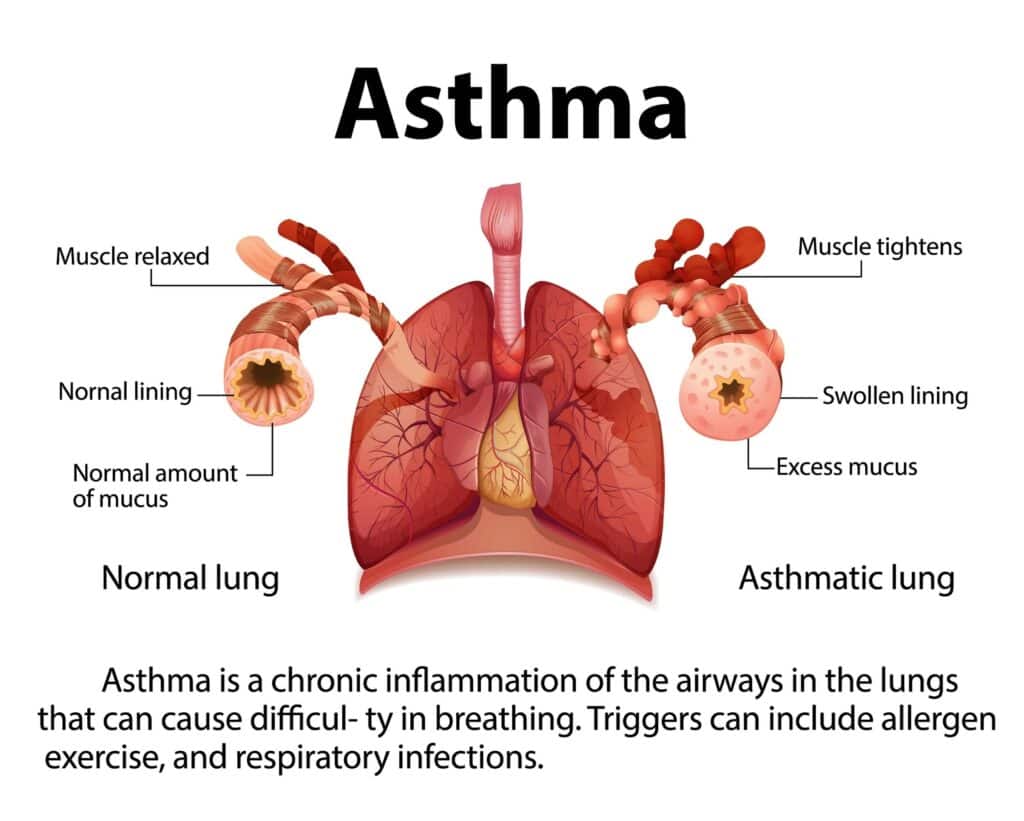Home » What We Treat » Illnesses » Asthma
Asthma
Urgent Care for Asthma
If you’re struggling with asthma symptoms, you need immediate and professional care. NextCare Urgent Care offers expert treatment for asthma, ensuring you get the relief you need quickly without the long waits often associated with emergency rooms.
What is Asthma?
Asthma is a chronic condition where your airways become inflamed and narrow, making it hard to breathe. It can be triggered by allergens, exercise, cold air, or stress. Symptoms vary from mild to severe and can include wheezing, shortness of breath, chest tightness, and coughing.
Causes of Asthma
Asthma can be triggered by various factors, including:
⊕ Allergens (pollen, dust mites, pet dander)
⊕ Respiratory infections (colds, flu)
⊕ Physical activity
⊕ Cold air
⊕ Air pollutants (smoke, strong odors)
⊕ Stress and strong emotions
Symptoms of Asthma
Common symptoms of asthma include:
⊕ Wheezing
⊕ Shortness of breath
⊕ Tightness in the chest
⊕ Coughing, especially at night or early in the morning

Testing and Treatment
At NextCare, our approach to treating asthma involves:
- Initial Assessment: Our healthcare professionals will evaluate your symptoms and listen to your breathing to determine the severity of your asthma.
- Immediate Treatment: We provide medications like bronchodilators (inhalers) to open your airways and help you breathe more easily.
- Asthma Management Plan: We’ll work with you to develop a personalized asthma action plan, which may include medications and strategies to avoid triggers.
- Follow-Up Care: We’ll give you tips on managing your asthma and preventing future attacks, including possible referrals to specialists if needed.

When to Visit Urgent Care for Asthma
Consider visiting urgent care if you experience:
⊕ An asthma attack that doesn’t improve with your regular inhaler
⊕ Difficulty breathing or shortness of breath
⊕ Persistent wheezing or coughing
⊕ Symptoms that disrupt your daily activities
Our urgent care centers offer comprehensive treatment for asthma, ensuring you get the right care promptly. Walk-ins are welcome, or you can save your spot online to reduce wait times.
Why Choose NextCare for Asthma Treatment?
⊕ Walk-in or Book Online: No need to wait on hold. Book your appointment online or simply walk in when it’s convenient for you.
⊕ Expert Care: Our medical teams are skilled in diagnosing and treating asthma quickly and effectively.
⊕ We Take Most Insurance: We accept all major insurance plans so you can get the care you need without worrying about the cost.
⊕ Nationwide Clinic Locations: With clinics in many states, there’s likely a NextCare near you
FAQs
Yes, our healthcare providers can diagnose asthma based on your symptoms and medical history. We may also use breathing tests to assess your lung function.
Yes, we can prescribe inhalers and other asthma medications to help manage your symptoms. If you need a refill or a new prescription, we’ve got you covered.
Visit urgent care if:
- ⊕ Your asthma symptoms are getting worse and not responding to your usual treatment
- ⊕ You have difficulty breathing or severe wheezing
- ⊕ Your symptoms are affecting your daily activities or sleep
For mild to moderate asthma attacks, urgent care is suitable. If you’re experiencing a severe asthma attack, especially if you’re not getting relief from your rescue inhaler, you should go to the ER immediately.
Common triggers include allergens (like pollen and pet dander), respiratory infections, exercise, cold air, air pollutants, and stress. Identifying and avoiding your triggers can help prevent asthma attacks.
- ⊕ Take your medications as prescribed
- ⊕ Avoid known triggers
- ⊕ Follow your asthma action plan
- ⊕ Keep regular appointments with your healthcare provider to manage your condition
Yes, NextCare treats asthma in both adults and children. Our medical staff is trained to handle pediatric asthma and provide the necessary treatment to keep your child comfortable and breathing easily.
If you’re having an asthma attack, use your rescue inhaler as directed and seek medical attention if your symptoms don’t improve. Stay calm and try to relax your breathing.
Asthma is monitored through regular check-ups with your healthcare provider, who will assess your symptoms and lung function. You may also use a peak flow meter at home to track your breathing.
